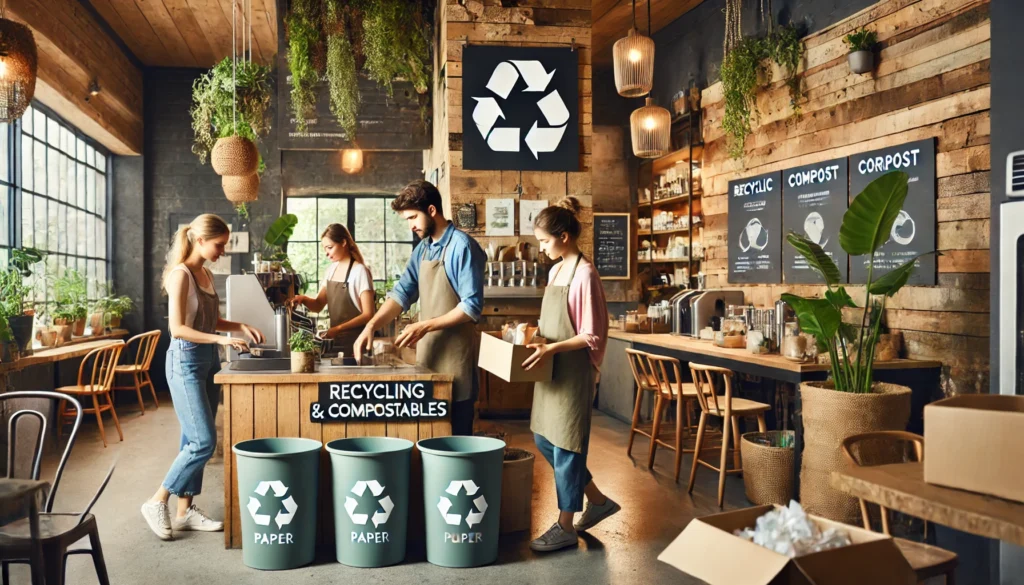Fun Fact: Did you know that small businesses comprise over 90% of companies worldwide? Their collective influence is massive, so they’re perfectly positioned to drive the Green Revolution.
Small businesses are emerging as powerful agents of change in a world increasingly concerned with climate change and sustainability. While the green movement was once largely driven by big corporations with substantial resources, today’s small businesses show that sustainability doesn’t require a vast budget. They are proving that even small, manageable steps can make a difference. So, how exactly can small businesses lead the Green Revolution? Let’s dive into the practical steps and inspiring examples illustrating how small businesses champion sustainability.
Why Small Businesses are Perfectly Positioned for Change
Small businesses often have a closer connection to their communities and the flexibility to adapt more swiftly than their larger counterparts. Their lean structure allows them to implement green practices without layers of bureaucracy. Moreover, their community roots mean they can lead by example, inspiring local consumers and other businesses.
Take, for instance, New Leaf Paper, a U.S.-based company specializing in sustainable paper products. Since its inception, New Leaf has focused on using 100% recycled paper, reducing deforestation impacts. This focus has led them to become a preferred supplier for eco-conscious customers, illustrating how small businesses can successfully champion green initiatives.
Practical Steps Small Businesses Can Take
Reduce, Reuse, Recycle
This is the backbone of sustainability and is often the easiest way for businesses to start. Implementing a basic recycling program, minimizing waste, and opting for reusable materials are affordable steps with immediate environmental impact.
Case in Point: Terracycle, an innovative waste management company, started small by creating upcycling solutions. They partner with brands to recycle hard-to-recycle materials, offering companies a viable way to reduce waste. Small businesses can replicate this by contacting recycling facilities to manage their waste sustainably.

Opt for Green Energy
Switching to renewable energy sources is one of the most impactful ways small businesses can reduce emissions. Solar, wind, and hydropower are increasingly accessible and affordable, with many regions offering incentives for switching to green energy.
Example: Green Street Solar, a local solar installation business, has focused on helping small businesses transition to solar. Small businesses that install solar panels reduce their carbon footprint and cut long-term energy costs.
Ethical Sourcing and Local Partnerships
Supporting local suppliers reduces transportation emissions and boosts the local economy. Small businesses that choose to source ethically also attract customers who value sustainability.
Example: Pukka Herbs, a small UK-based herbal tea company, sources organic and Fair Trade-certified ingredients. This commitment benefits the environment and appeals to a customer base that values ethically sourced products.
Efficient Use of Resources
By using energy-efficient appliances, reducing water waste, and conducting energy audits, small businesses can ensure they make the most out of their resources. Small cafes, for example, might use LED lighting, energy-efficient espresso machines, and eco-friendly cleaning products.
Go Paperless or Use Eco-Friendly Paper
Adopting digital tools can dramatically reduce paper use. Opting for recycled or sustainably sourced options makes a huge difference if paper is necessary.
Engage Customers in Sustainable Practices
Offering customers incentives to participate in sustainability programs—such as discounts for bringing reusable bags or cups—engages them in the green mission. Naked Earth in New York discounts customers who bring reusable containers, thus reducing single-use plastic waste.
Examples of Small Businesses Leading the Green Revolution
Bee’s Wrap
Bee’s Wrap produces reusable food wraps as an alternative to plastic wraps. Founded by a small business in Vermont, Bee’s Wrap has dedicated itself to sustainability using natural materials like organic cotton and beeswax. Their mission to reduce plastic waste resonates with eco-conscious customers, illustrating that even small businesses in niche industries can make a significant impact.
Ecostore
Ecostore creates environmentally friendly cleaning and personal care products based in New Zealand. They offer refills and have transitioned to plastic-free packaging, setting a high bar for sustainability. Ecostore’s success story showcases how small businesses can adopt circular economy principles, thereby reducing waste at every stage.
The Little Green Shop
The Little Green Shop is a small boutique that sells eco-friendly home products. It partners with brands that meet its sustainability criteria and supports a range of businesses that value the environment. Through mindful sourcing, The Little Green Shop has become a go-to spot for consumers who want eco-friendly options.

Overcoming Challenges in Going Green
The sustainability journey isn’t without its challenges. For many small businesses, the cost of sustainable products or the upfront cost of renewable energy installations can be daunting. However, grants, loans, and government incentives are available. Additionally, companies like Kiva, a non-profit lending platform, provide microloans to small businesses, helping them overcome financial barriers to go green.
Benefits of Leading the Green Revolution
Enhanced Brand Image: Businesses focusing on sustainability can build a loyal customer base that values and supports eco-friendly practices.
Cost Savings: Energy-efficient practices and waste reduction often lead to lower operating costs, helping businesses save money in the long run.
Regulatory Compliance: With governments pushing for stricter environmental laws, small businesses leading the Green Revolution will likely be ahead of the curve.
Conclusion
Small businesses play an essential role in driving sustainability, transforming their operations and influencing their communities and customers. The examples of New Leaf Paper, Bee’s Wrap, and countless others prove that you don’t need to be a corporate giant to lead the Green Revolution. Small steps—like reducing waste, opting for green energy, and engaging customers—can collectively make a substantial difference. Together, small businesses can shape a sustainable future, proving that no contribution is too small when it comes to protecting the planet.
Author’s Note:
Thank you for reading! It’s inspiring to see how small businesses are making strides toward sustainability. I hope this guide encourages you to support local businesses that are leading the green charge or even to make eco-friendly changes in your business. Together, we can make a big impact!
G.C., Ecosociosphere contributor.
References and Further Reading:
- Small Business Sustainability Practices
- Renewable Energy Incentives for Small Businesses
- Why To Switch To Renewable Energy Sources | FactoryTwoFour. https://www.factorytwofour.com/why-its-important-to-switch-to-renewable-energy-sources/
- Economic Recovery and Small Business: Navigating the Path to Success – B A Stock Broker. https://b-a-stockbroker.com/economic-recovery-and-small-business-navigating-the-path-to-success/




